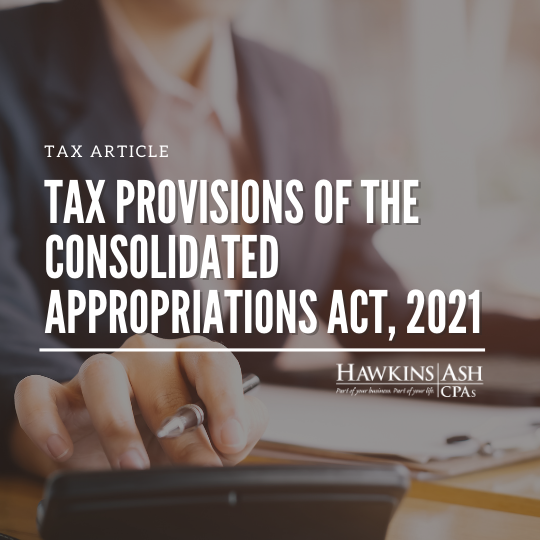The Consolidated Appropriations Act, 2021 (Act), includes many tax provisions that have been made permanent. For tax law purposes, “permanent” means there is no sunset provision. In other terms, the law is not set to expire or will not change unless lawmakers decide to change it with future legislation. There are some provisions that have been extended by this Act as well. The following items are some of the notable changes.
The medical expense deduction floor of 7.5 percent of Adjusted Gross Income (AGI) has been made permanent. This provision now applies to all taxpayers regardless of age. Starting in 2020, individuals can claim an itemized deduction for unreimbursed medical expenses to the extent such expenses exceed 7.5 percent of AGI.
Another permanent provision effective for tax years after December 31, 2020, is that this Act repeals the qualified tuition deduction. However, in conjunction with this change, the Consolidated Appropriations Act increases the AGI phase-out limits for the Lifetime Learning credit from $58,000 ($116,000 for joint filers) to $80,000 ($160,000 for joint filers), thus in the vast majority of circumstances, these changes will not negatively impact taxpayers.
The Work Opportunity Tax Credit (WOTC) has been extended through 2025. This provision has a sunset date; it has not been made permanent. The WOTC is an elective general business credit available to employers hiring individuals who are members of targeted groups. Some of the targeted groups include, but are not limited to: qualified veteran, ex-felon, summer youth employee, qualified IV-A recipient, and the list goes on.
Sign Up to Receive Email Updates
Be sure you’re getting the latest insights as legislative developments occur. We’re here for you with tax insights and business resources.
Sign Up Now
The provision to exclude from gross income the discharge of qualified principal residence indebtedness has been extended through 2025. The provision reduces the maximum amount that may be excluded from $2,000,000 to $750,000. In general, the qualified indebtedness must be from the acquisition, construction, or improvement of the taxpayer’s primary residence.
The Act extends through 2021, the provision that allows taxpayers to deduct on 1040 Schedule A, their qualified mortgage insurance premiums, also known as PMI – Private Mortgage Insurance. For purposes of this provision, taxpayers will phase out of this deduction once their AGI exceeds $100,000 ($50,000 married filing separate).
Under current law, a deduction is allowed for only one-half (50 percent) of business meals. This Act adds a provision that provides business owners with a 100 percent deduction for business meals, including any carry-out or delivered meals, provided by a restaurant that is paid or incurred in 2021 and 2022.
The CARES Act which was signed into law back in March 2020 allows for an “above the line” deduction up to $300 in cash donations to qualifying organizations. This provision was available for tax year 2020 only. However, this Act extends and modifies the non-itemizer charitable deduction for 2021. For 2020, the $300 limit is the same for single filers and married filing joint filers. The deduction for 2020 occurs “above the line” meaning it reduces both AGI and taxable income. For 2021 the provision increases the maximum amount that may be deducted to $600 for married filing joint couples; however, the $300 limit remains for single and married filing separate filers. For 2020, a 20 percent penalty applies to tax underpayments attributable to any overstated cash contribution by non-itemizes. For 2021, the penalty is increased to 50 percent. For both 2020 and 2021, the non-itemizer charitable deduction is only available to those taxpayers who do not itemize their deductions via 1040 Schedule A.
Need help understanding and planning for your tax situation. Contact a Hawkins Ash CPAs tax professional today.





